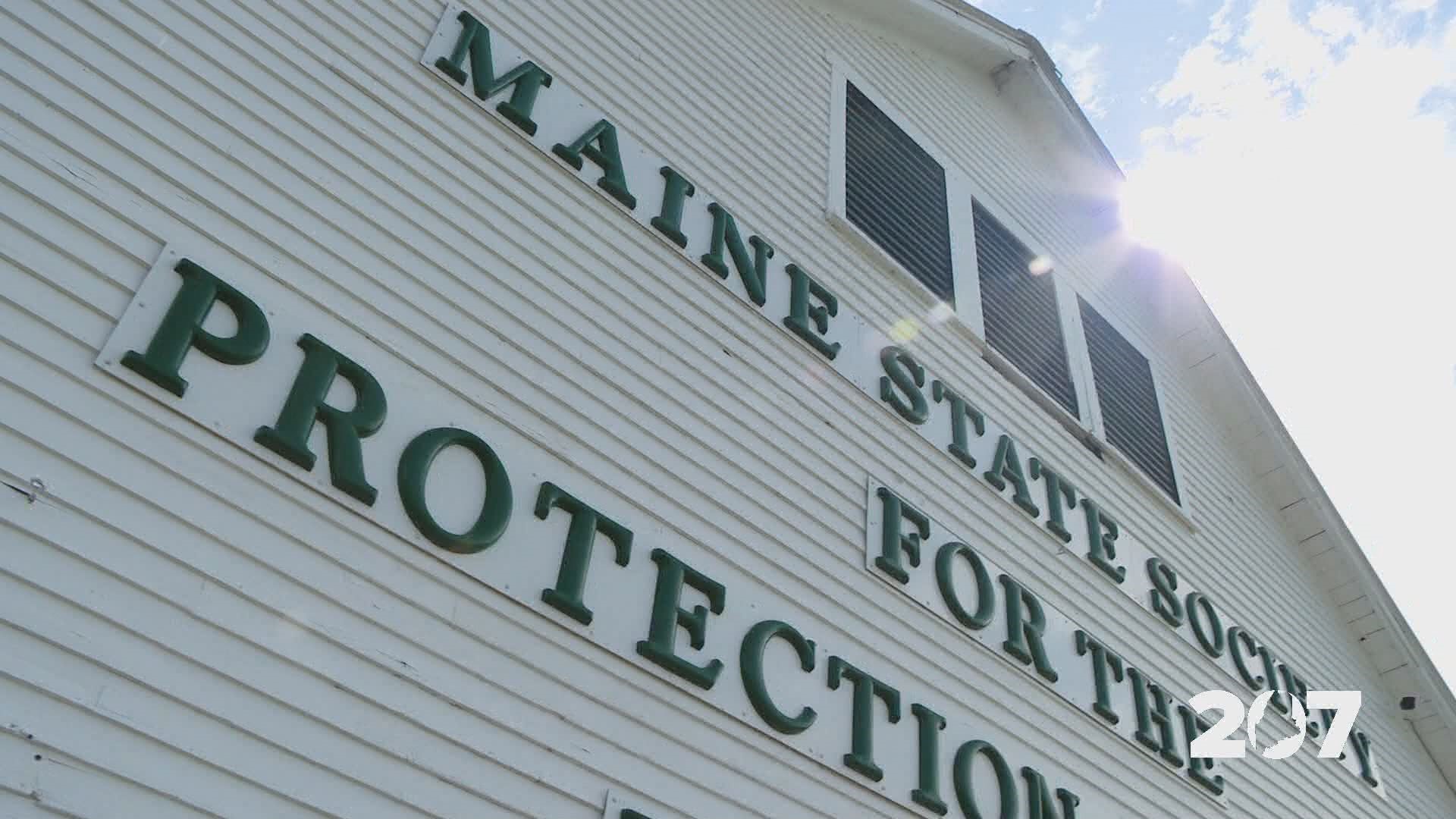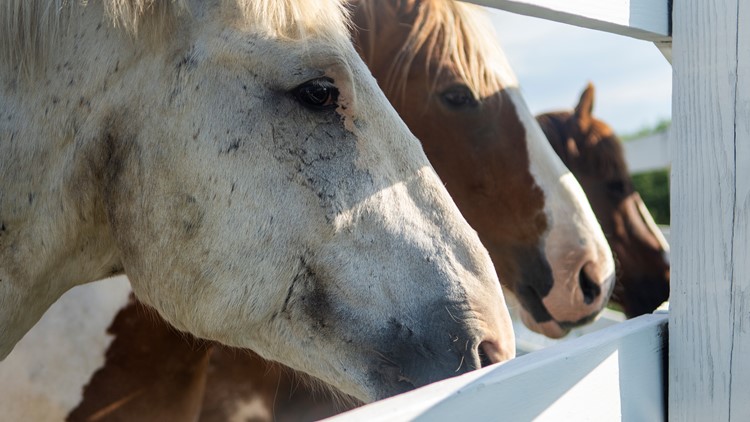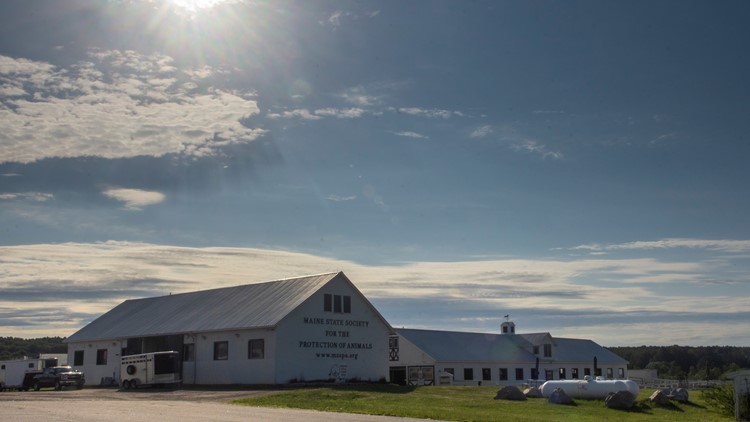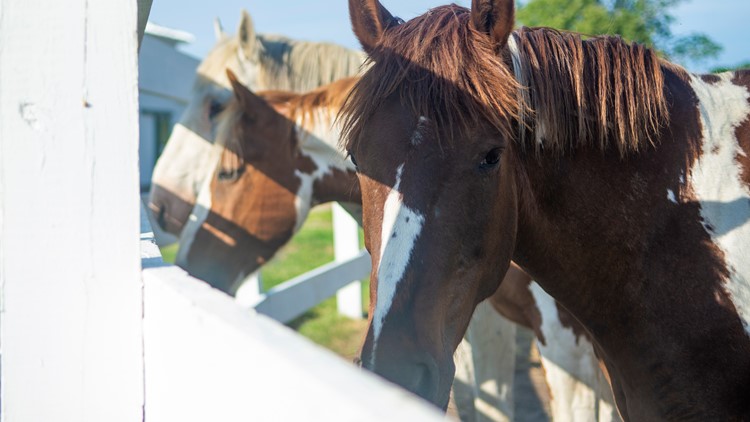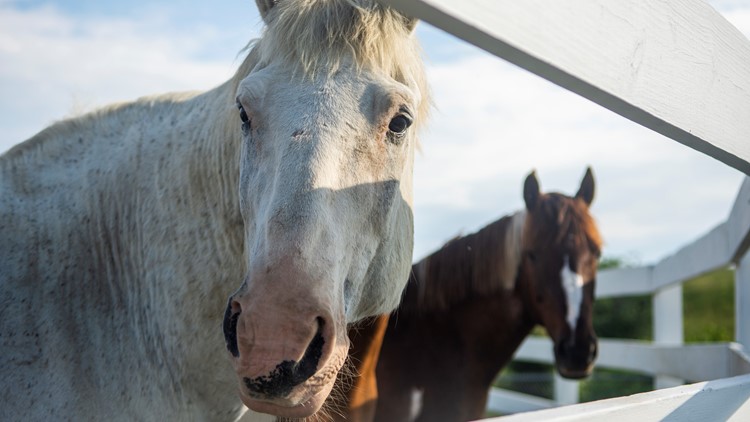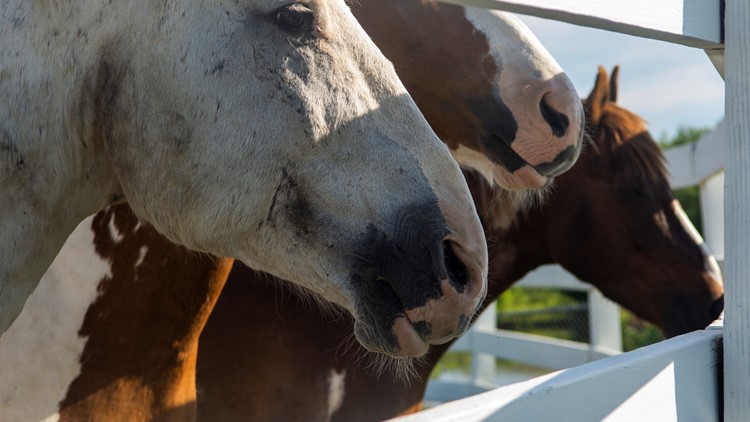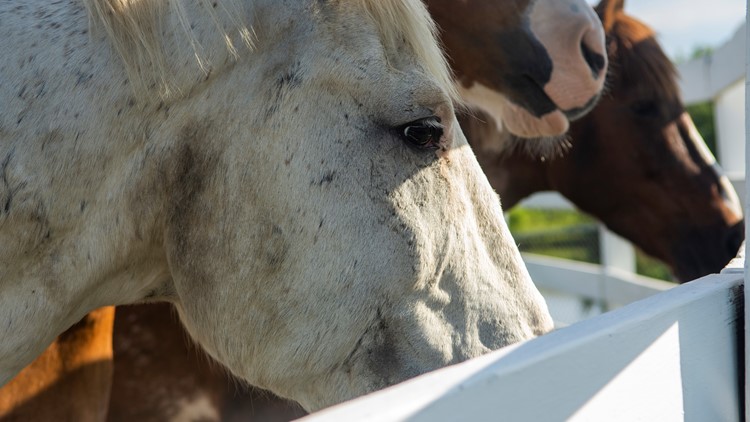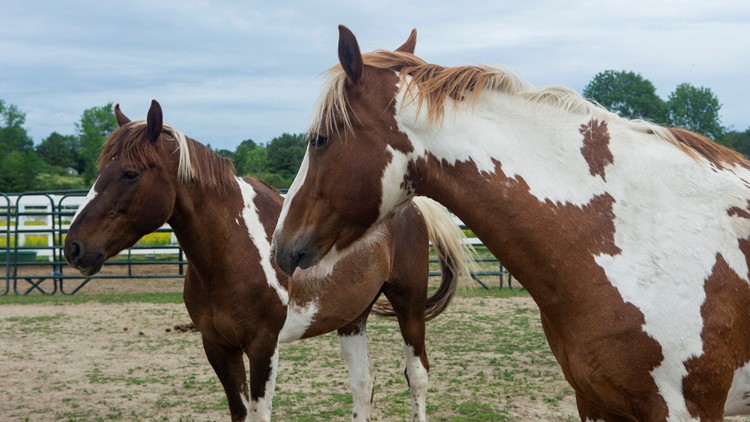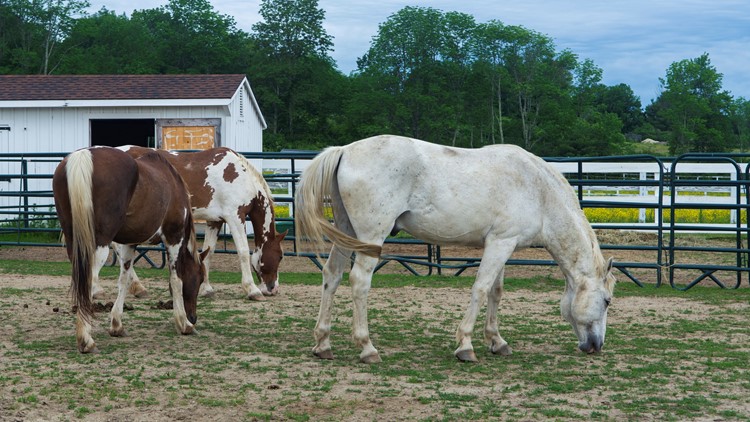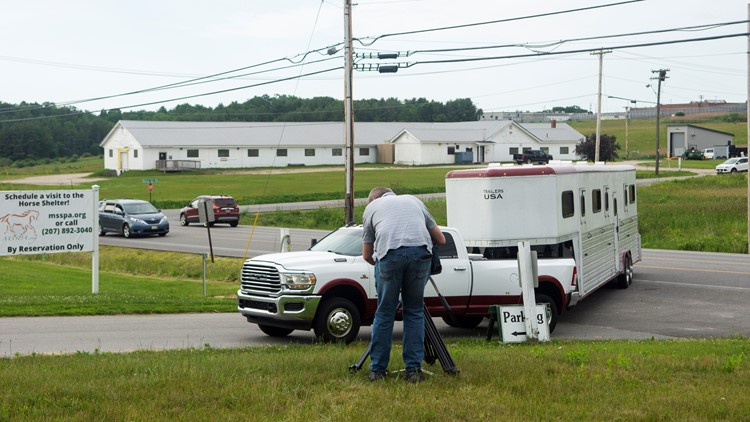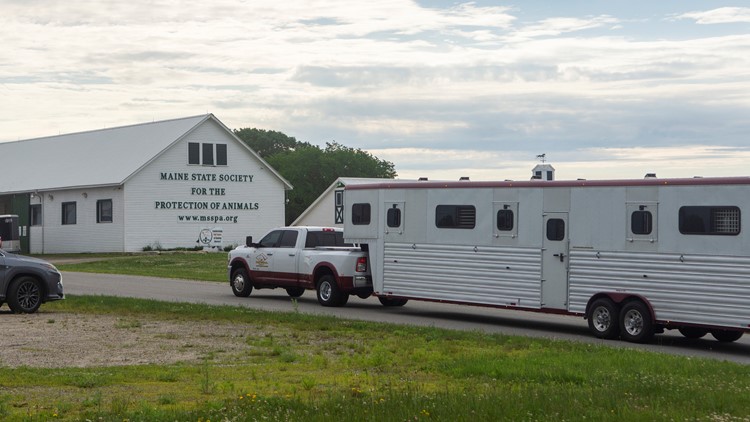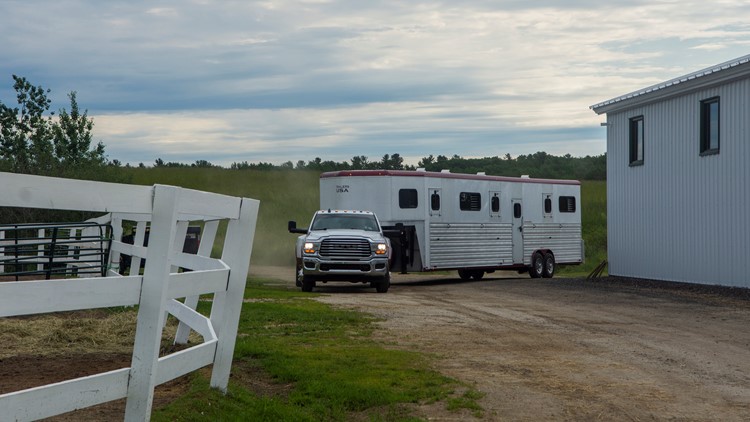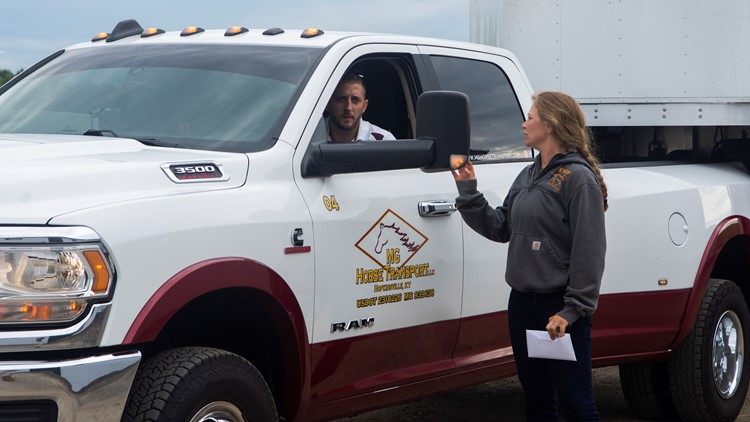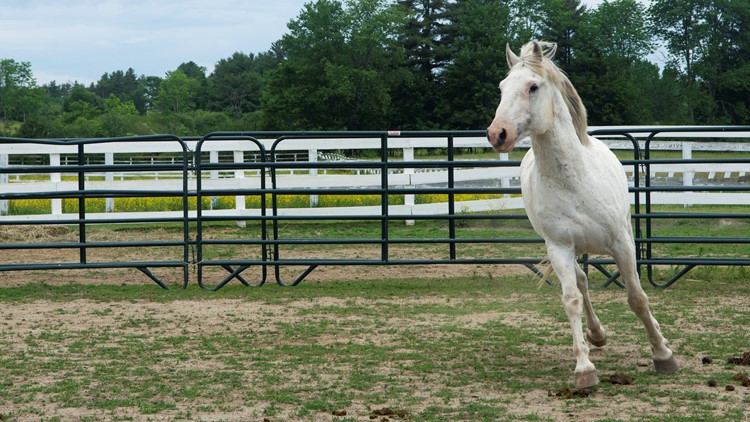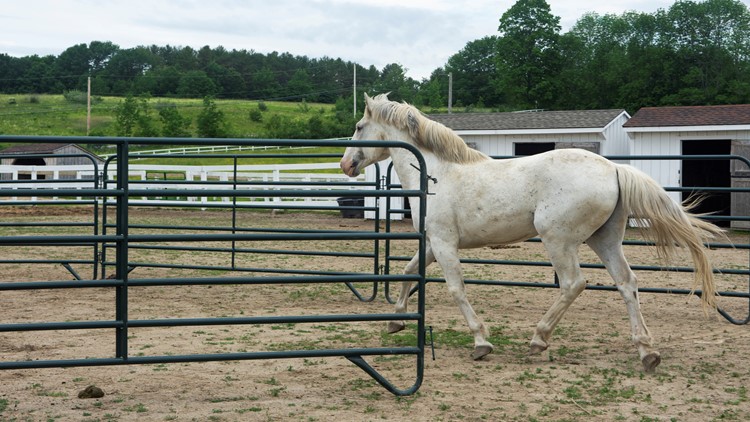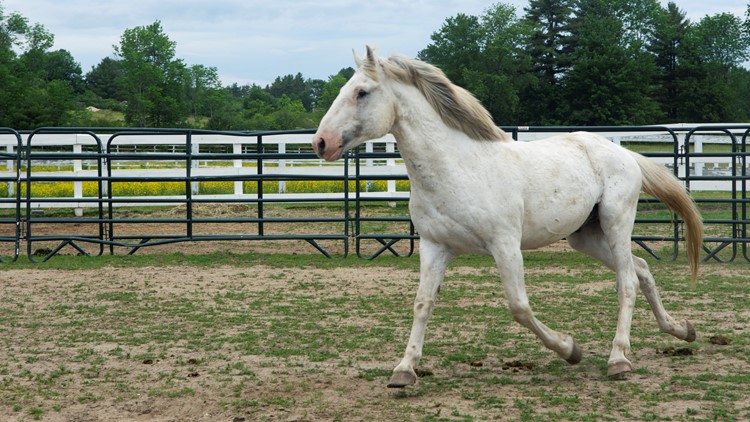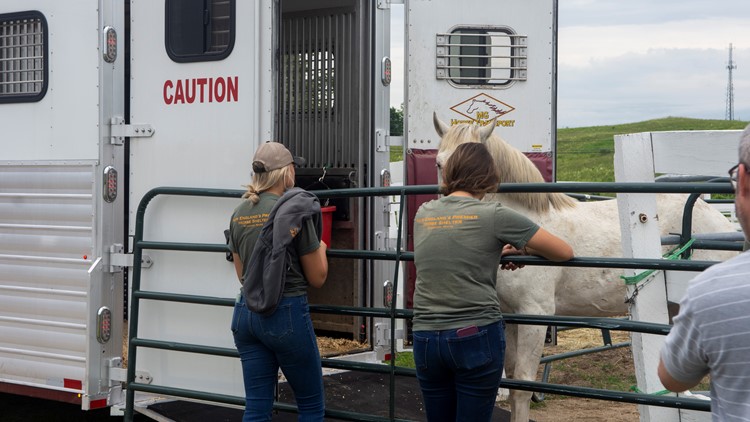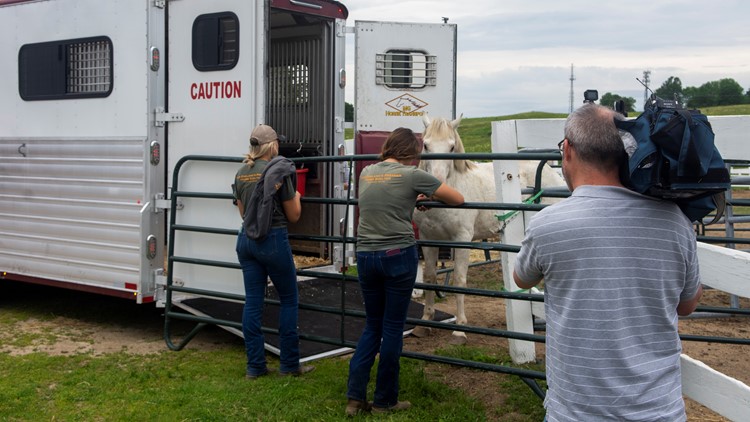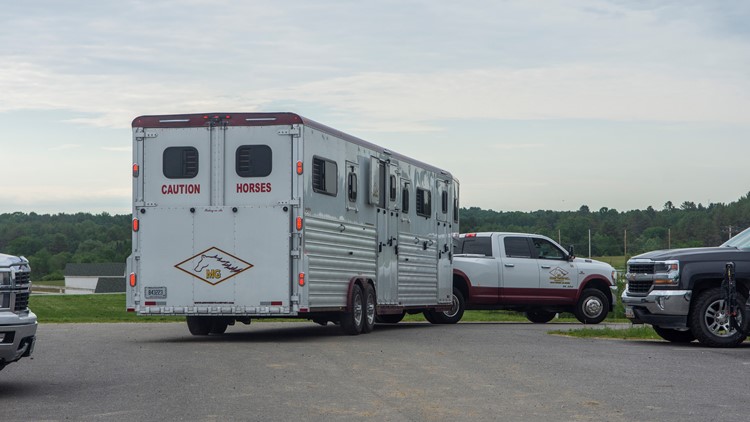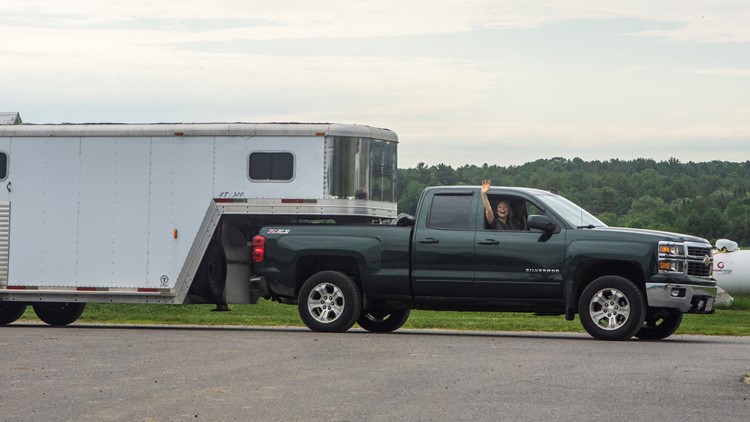WINDHAM, Maine — Last July, the state stepped in and seized a herd of abused and mistreated horses from a farm in Springvale. "The Neglected 20," as they were called, were taken to the Maine State Society for the Protection of Animals, or MSSPA, in Windham.
207's Peggy Keyser and videographer Kirk Cratty were at the farm when they arrived and followed the progress of the herd through the fall. A year later, most of the twenty horses had been adopted, although a few were in such bad shape they had to be euthanized. The last three were wild mustangs, and the next two-part chapter in their story captured the attention of horse lovers across the country.
Part One
It is what set them apart on that July afternoon. While all the other horses, still stirred up from the unease of the seizure, stepped hesitantly off the trailer, these three wild mustangs shot off the trailer like bullets. They weren't used to humans, and they didn't want to be confined.
The seizure was unprecedented in the 150-year history of the Maine State Society for the Protection of Animals: 20 horses in need of food, water, extensive medical care, and patient, loving attention to recover from months of neglect.
But the mustangs – Annie, Silver, and Phoebe – would present a different sort of challenge.
"These three mustangs, we have spent a lot of time with them, evaluating them, getting to know them, trying to understand their needs because they’re really fundamentally different from domestic horses," MSSPA CEO Meris Bickford said. "They’re really wild animals because they were captured as adult wild animals."
MSSPA assistant barn manager Madison Donohue has dealt with plenty of horses, but never wild horses. She recalled that Phoebe was especially challenging.
"I went out there kind of five days in a row, and every day I was able to halter her. But it took me longer and longer, and she kind of got more aggressive about being haltered," Donohue said. "She kind of really made it clear that she doesn’t want to be handled. You can go up to her, you can pet her on both sides, she’s not afraid of humans. But I think she’s afraid of what humans may do to her."
It became clear that these horses would likely not find the usual adoptive homes that the MSSPA seeks for every horse in its care.
"They really belong in the wild, and so we started looking for a wild horse sanctuary, somewhere in the country that would receive them and return them to the life they deserve," Bickford recalled.
That search led them to the 9,000-acre Skydog Ranch and Sanctuary in Bend, Oregon. Donohue reached out to Skydog to see if these three Maine mustangs could make their home 3,000 miles away.
Skydog said yes.
Clare Staples is the founder of Skydog.
"It was amazing to see them pop up again in an email and see their faces and their original posts, and I remember them," Staples said.
Skydog’s mission is to rescue at-risk mustangs and return them to the wild. Staples follows mustang sales and adoptions online, keeping track of a breed that many regard as a part of American history.
"Really, it’s the only horse breed in the world that is defined essentially by the land that they were born on," Staples explained. "Mustang is essentially the word for feral horse or wild horse."
"The space that we have really allows those horses to be re-wilded and go back to their wild selves and not be bothered very much with humans if they don’t want to," she continued.
These three mustangs, originally from Idaho, were sold to the Springvale farm in 2021. They spent about four or five months there before the state brought them to the MSSPA.
Staples had noticed these three horses online.
"I followed the internet adoption that these three horses were on, and I always tend to look at the seniors because we have a lot more concern for those because they’re a lot harder to transition into domestic life," she said. "A lot of people might take on a 20-year-old mustang and then realize they are very out of their depth in terms of trying to train them or domesticate them."
Bickford, who has worked with countless horses during her time at the MSSPA, put it this way: "In the wild horse world, it’s not that uncommon for wild horses to be purchased or adopted by people who are well-intentioned but ultimately are not able to provide these horses with what they need. Or, the horses themselves may not be suitable for domestication."
And so, detailed planning began for the effort to transport these three mustangs, bringing their journey – from Idaho to Maine and back to Oregon – full circle. Skydog Ranch was happy to partner in this effort.
Referring to the MSSPA, Staples had this to say: "This organization has stepped up in such an incredible way for these horses in really seeing through for all of those horses that were rescued finding exactly the right fit for each of them."
As she has done so many times before, she prepared to welcome these new mustangs.
"It is wonderful, and it never gets old," she said. "I don’t think I’ve ever released a horse back into the wild without it getting very emotional."
The MSSPA announced the plan to relocate the horses to Oregon a few weeks ago and began making arrangements to ship the horses cross-country. In part two of our story, we followed along with that journey.
Here is the original story about the seizure and care of "The Neglected 20."
PART TWO:
On the morning of the mustangs' departure, we were back at the farm on River Road in Windham to watch them embark on their "full circle" journey. When you care for a barn full of horses, the days always start early, but that morning was particularly meaningful.
This day would mark the end of nearly a year of what the MSSPA does best; bringing "The Neglected 20" and all the other horses in their care back to health, having said a gentle farewell to the horses that were too compromised to save.
'The Maine Three': Mustangs return to the wild
Before these mustangs could take to the road, there were last-minute tasks to be done and paperwork to be checked. A peek inside the trailer where they’d live for the next five or six days showed how complicated and expensive an undertaking shipping these horses cross-country would be. It was the farthest away that mustangs have ever traveled to join the other mustangs at Skydog Ranch.
Once loaded, they would stay on the trailer for the duration of the trip. Madi Donohue traveled behind the trailer to tend to the horses each day.
"These horses have grown to know me and trust me over the past year that it’s helpful for them to kind of have a familiar face with them, and so I’m very comfortable going in and taking care of them," she said.
Each night, Donohue updated the MSSPA's social media followers with news from the day. Each day they traveled 600 or 700 miles en route to Oregon. As they racked up the miles, more and more followers tuned in to witness their progress.
"It was a lot of blood, sweat, and tears, as people say, to get to this. It’s something I have never experienced, I have never dealt with wild, feral mustangs before so every single moment I was with these horses was a very big learning experience for me," Donohue recalled.
The mustangs traveled in a truck that had them in full-size stalls. They could move about, access hay and water, and even lie down to rest. It was equipped with close-circuit cameras, and it was clear the horses were calm, comfortable, and oblivious to the attention that was being paid to them.
On the other side of the country, as Clare Staples awaited their arrival at Skydog Ranch, she had this to say: "The wild horse is such a symbol of the American West it’s a beautiful thing to be able to do, I have to say. Just beautiful."
This was the work that she now does every day: receiving wild mustangs, re-connecting them to their herds, and making sure they live out their days protected in the wild.
"Maybe there’s a part of all people that their spirit wants to be wild and free and I think through these wild horses we get to live vicariously a little bit through them to be re-wilded and be free – which is such a basic value of America," Staples said.
Finally, after five long days on the road, the three Maine mustangs arrived safely in Oregon. Their first, hesitant steps off of the trailer were into a pen where they could be assessed.
Over the past 18 months, these horses have left the only home they ever knew to travel across the country to a place where they were neglected and forgotten. When their journey took them to the MSSPA, little did anyone know that this day would come.
Skydog Ranch gave its new family members a few days to settle in, and then – as thousands of followers and horse-lovers across the country had hoped – Phoebe, Annie, and Silver returned to their home on the range.
Back in Maine, Meris Bickford reflected on the experience.
"While it is very moving emotionally, I have to say too it is also incredibly satisfying to have the opportunity to work with the MSSPA and fashion the right outcome for each and every horse that’s here," she said. "These are certainly unusual, and in the 15 years I’ve been here, we’ve never had horses quite like this and I never would have imagined that we would be partnering with such a wonderful facility, all the way to Oregon. The logistics of it are challenging, the emotions of it are sometimes overwhelming, but the outcome is the right one."
Skydog Ranch is home to about 200 mustangs and 50 wild burros. When mustangs are in the wild, they form families and stay in those small groups on the range. Sky Dog already had a Phoebe, so she has been renamed "Sienna."
You can learn more about the journey of The Maine Three, and the work of the Maine State Society for the Protection of Animals, by clicking here. To learn more about Skydog Ranch, click here.
You can follow the MSSPA on Instagram at @mainehorserescue and follow Skydog Ranch at @skydogsanctuary. If you’d like to follow along with The Maine Three, visit Skydog's Instagram page, where you can follow #skydogsilver, #skydogannie, and #skydogsienna.

